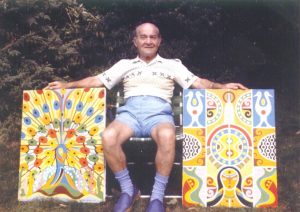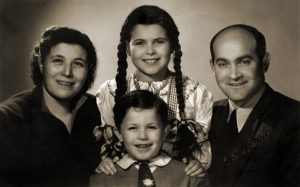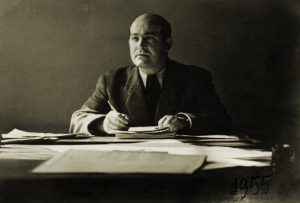In the Unlikeliest of Places
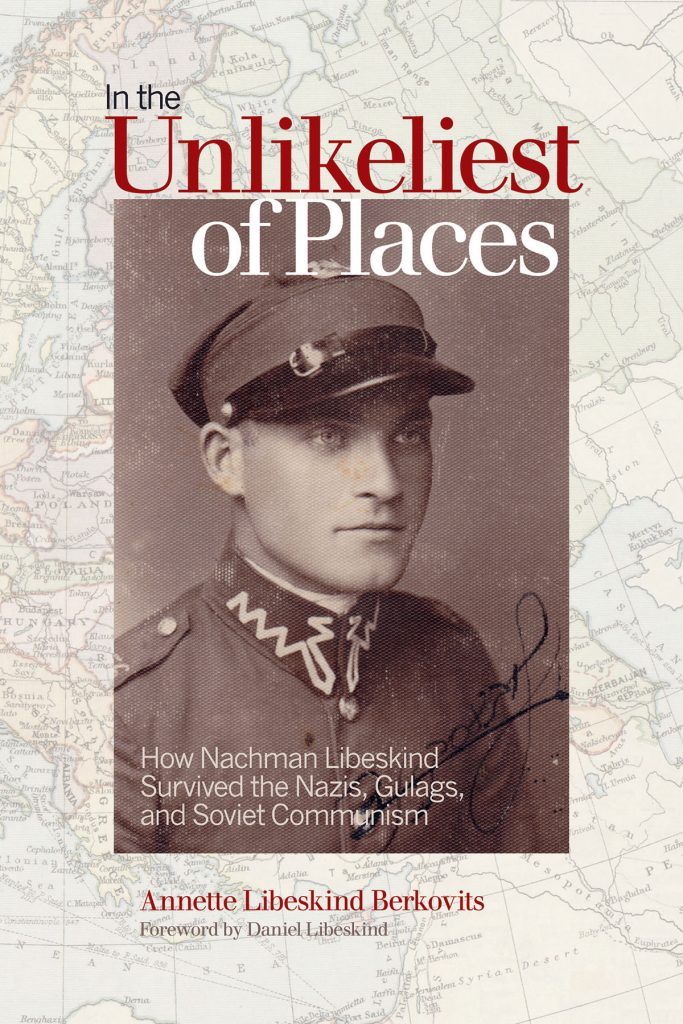
Buy the Book:
Amazon
Wilfrid Laurier University Press
Barnes & Noble
Bookshop
Books-A-Million
IndieBound
Published by: Wilfrid Laurier University Press
Release Date: September 5, 2016
Pages: 296
ISBN13: 978-1771122481
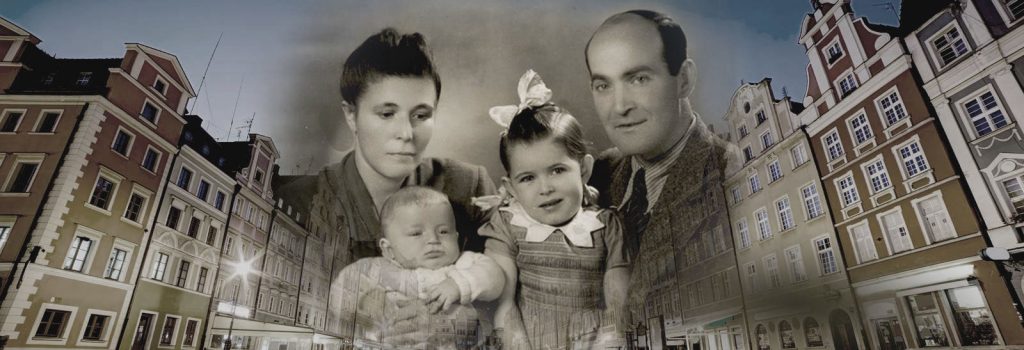
Overview
Three years after her father’s death, Annette was going through his things and found a box of tapes—several years’ worth—recounting his spectacular life, triumphs, and tragedies. Nachman Libeskind’s remarkable story is an odyssey through crucial events of the twentieth century.
With an unshakable will and a few drops of luck, he survives a pre-war Polish prison; witnesses the 1939 Nazi invasion of Lodz and narrowly escapes; is imprisoned in a brutal Soviet gulag where he helps his fellow inmates survive, and upon regaining his freedom treks to the foothills of the Himalayas, where he finds and nearly loses the love of his life.
Later, the crushing communist regime and a lingering postwar anti-Semitism in Poland drive Nachman and his young family to Israel, where he faces a new form of discrimination. Then, defiantly, Nachman turns a pocketful of change into a new life in New York City, where a heartbreaking promise leads to his unlikely success as a modernist painter that inspires others to pursue their dreams.
With just a box of tapes, Annette Libeskind Berkovits tells more than her father’s story: she builds an uncommon family saga and reimagines a turbulent past. In the process she uncovers a stubborn optimism that flourished in the unlikeliest of places.
View the Gallery
-
Nachman with his paintings.
Copyright © 1983-2016, Nachman Libeskind. All rights reserved.
- 1952 Libeskind family photo, Lodz, Poland
- Nachman at his office in “Centrala Tekstylna” in Lodz, Poland in 1955. He was the Divisional Director at this largest textile business in Poland
Reviews
“…Berkovits, Libeskind’s daughter and the author of this cinematically gripping debut biography, does a masterful job weaving together a coherent narrative, culled largely from tape recordings that her father left behind. She has a rare gift for storytelling… the prose is lively and direct, and the story is deeply affecting… A moving tale that’s emotionally powerful and historically edifying.”
—Kirkus Reviews
“…an incandescent biographical tribute to the author’s father, Nachman Libeskind, an eternally hopeful survivor…Berkovits traces such challenges (as maintaining one’s Judaism after the Holocaust) though her generation and the next, and this journey—a story within a story—warrants attention and reflection....some of Nachman’s art is included late in the book, adding dimensionality to a text already replete with it. …Though this is, inescapably, a Holocaust survivor’s biography, it is not dominated by those horrors; rather, it celebrates the ingenuity with which one man made his time less about enduring than about living vibrantly.”
—Clarion Foreword Review
“This is a book that works on so many levels: as the biography of a Polish Jew who narrowly escapes two murderous totalitarian systems, as a personal journey that leads to a new life in the United States marked by optimism and accomplishment―and, above all, as the beautiful, heartfelt tribute of a daughter to her remarkable father.”
—Andrew Nagorski, author of Hitlerland: American Eyewitnesses to the Nazi Rise to Power (2012)
“The deeper I went into In the Unlikeliest of Places the more I found my eyes tearing up―not from the suffering of victims of the Holocaust but from the beauty of the extraordinary courage and success of Nachman Libeskind. It is, of course, the success of a whole family, a whole people refusing to accept defeat, but it’s especially the defiance and joy in his spirit that is so moving. When he goes to Berlin to see the Jewish Museum, designed by his son, Daniel Libeskind, and when he takes up painting in his eighties, not as an old man’s busywork but with craft, power, verve, and a brilliant sense of color and composition―those victories moved me more than any recent book on the Holocaust and survival. That man! You’re going to love him and love the people who supported and believed in him, especially his wife Dora and his children―Annette and Daniel―and his grandchildren.”
—John J. Clayton, author of Many Seconds into the Future (2014) and Mitzvah Man (2011)
“This is a beautifully written saga of a Jewish family before, during and after World War II. The Holocaust must never be forgotten. The historical value of survivor testimonies is important to preserving the collective memory of humanity.”
—Hanna Davidson Pankowsky, author of East of the Storm: Outrunning the Holocaust in Russia
"This oral history was coupled with her own research to give historical and cultural context and insight, as well as her lifetime of memories with her family. It’s a lot of information, but it works beautifully and the story evokes a range of emotions – her father is a genuinely charming, warm person whose observations are adorable and sweetly humorous, but there are passages that bring you to tears too."
—What's Nonfiction?
"In the Unlikeliest of Places... is an extraordinary and compelling biography that is a simply riveting read from first page to last."
—Midwest Book Review
“Nachman Libeskind is an immensely likable protagonist — a defiant optimist and lover of humanity who stood up for his beliefs under the toughest of circumstances. His experiences during the war constitute a tale of triumph over adversity.”
—Julia M. Klein, contributing editor at Columbia Journalism Review and a contributing book critic for the Forward
“…At the center of a biography that unfolds like a novel is Nachman Libeskind, an authentic contemporary superhero. What is the source of the inextinguishable optimism that enables him to triumph over seemingly overwhelming odds?”
—Joan Downs, Editor-in-Chief, Wildlife Conservation Magazine
“…on one level, a thriller detailing narrow escapes from the Nazis and the Soviet gulag; on the other, it’s proof -positive of Libeskind’s enduring optimism and a mindset that allowed him to find goodness in others. A haunting testament to the triumph of the human spirit…”
—Barbara Donsky, author of Veronica’s Grave
“An incredible true story of survival in the face of unimaginable hardships. Berkovits writes with the love and respect you would expect from a daughter author, but the authenticity of this story, and her mastery of prose, are both evident from the first page to the last.”
—G. Elizabeth Kretchmer, author of The Damnable Legacy
“…wonderful – as true a tale as they come, but with all the hallmarks of literature – deep characters, a narrator we believe in, an exciting plot full of tragedy, and danger, and loss and humor, and most profoundly, love.”
—Nikki Schulak, prize winning poet, memoirist and essayist
What Readers Say
“This is probably the best book I have ever read about life during the second world war. A true story, written by a daughter from tapes and memories of stories told, this is a rich tapestry. Nachman is the most likeable and lovely man, with high morals. Reading about all he did to help where he could was humbling, though you never get the sense that he is a do-gooder. His strong personality shines through the entire book, and had me spellbound. When I read of his death at the end of the book, I cried. It was like a great friend had passed away. The author should be very proud – not only did she have a one in a million, wonderful father, but she has a great talent and through her writing she has brought him to life for us.”
—Laura Smith, UK
“So far I have read only one chapter but feel compelled to comment. This is a tapestry of a book. It is a historical story about the author’s father and also Europe; this is a historical account about a family from rural roots moving into a city and what that took to survive and then there is the tale of a family in the context of being Jewish in Poland – the politics of Poland at that time; the politics of the industrial revolution; how Judaism was changing in the twenties and thirties; it’s permutation after permutation of cultural and personal depth.
To bring all that to mind in just one chapter is amazing. This is what divides art from…. I don’t know – all those things that we read, or watch that are forgettable. Art pulls us in, shakes us up, art is not passive, it makes us dance with it whether we want to, or not.”
—Jim Cooper, New York
Articles
In the Unlikeliest of Places and Annette Libeskind Berkovits were featured in the following articles:
Forward, October 2016
“Berkovits’s book about her father, “In the Unlikeliest of Places,” recently rereleased in paperback, is hard to characterize. It is a biography, but also a memoir that draws heavily on conversations, family correspondence and, above all, tape recordings he made, in Yiddish and English, before his death, in 2001, at 92.”
Read the full article
Miami New Times, September 2016
“Three years after her father’s death, Annette Libeskind Berkovits could still barely surmount the grief. She kept avoiding the inevitable task of going through his clothes and belongings, instead keeping them out of sight, if never out of mind. When she finally decided to venture into his old room and navigate the depths of his closet, however, Berkovits found a relic that changed her life.”
Read the full article
Foreword
By Daniel Libeskind
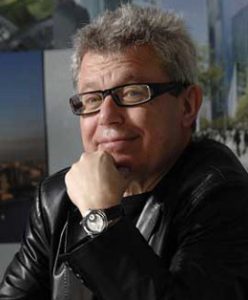 Daniel Libeskind is an internationally renowned architect, known for the Jewish Museum in Berlin, the Royal Ontario Museum in Toronto, and the Dublin Performing Arts Center in Ireland. His practice is designing commercial, residential, and cultural buildings around the world. His Master Plan for rebuilding the World Trade Center site in New York City was selected in 2003 and has served as the blueprint for the entire site, including the Freedom Tower, the Memorial, the Museum, and the PATH Terminal.
Daniel Libeskind is an internationally renowned architect, known for the Jewish Museum in Berlin, the Royal Ontario Museum in Toronto, and the Dublin Performing Arts Center in Ireland. His practice is designing commercial, residential, and cultural buildings around the world. His Master Plan for rebuilding the World Trade Center site in New York City was selected in 2003 and has served as the blueprint for the entire site, including the Freedom Tower, the Memorial, the Museum, and the PATH Terminal.
Book Excerpt
Part I: Before
“…It helped that after the meagre, tasteless prison diet Nachman developed a voracious appetite. He hoped that it would help him gain enough weight to meet the military’s minimum standards. Despite his imprisonment by the repressive regime, he had not lost his desire to serve. In fact, he was more determined than ever to prove that Jews were as able as their Polish peers to handle military discipline and weapons. Each time his mother served him a portion of food he would say, “Mama I am hungry as a bear. I need some more,” then immediately felt guilty because food was not plentiful.
Nachman arrived at his third medical commission with trepidation because he knew it was his last chance. When the military physician asked him to step on the scale Nachman, undaunted, trained his eyes on the upper weight as the doctor slid it along the increments of the metal beam. He exhaled when it came to rest two notches higher than ever before.
“You made it, finally!” the doctor said, and signed the requisite form. “Report to the officer down the hall with this document.” Nachman felt as if he had won the lottery. He sashayed into an office full of young men who had passed their medicals and approached the desk, proffering his prize document. The officer on duty looked up and said, “Libeskind? Are you of German extraction?”
Now, I’ll be sunk, Nachman thought, but he answered looking directly into the officer’s face.
“No, sir, I am a Jew.” The officer smiled. “Are you sure you want to serve?” “I believe I have some talents the army might find useful,” Nachman said.
“If you won’t accept me you will never know.” The officer raised his eyebrows in surprise, visibly chose to overlook the impertinence. “All right, then,” he said. “Here is a list of things you need to bring when you are called up for service.” And then he called out, “Next!”
Nachman counted the days until he had to report for basic training. His friends thought he had gone mad. At last, in March 1933 the military called him. A three-hour journey by train took him to join the Fifty-sixth Infantry Regiment in Krotoszyn, a town southwest of Lodz, dominated by an old Prussian castle. When Nachman arrived at his base he was processed and issued a uniform. He was dazzled by it. He couldn’t believe his image when he saw himself in it in the mirror for the first time. He admired his reflection and felt as if he had gained a foot in height. How different he looked from his days as a prison inmate. He smiled to himself: If Jadwiga or the other girls would see me now, they’d go crazy.
Soon he was called in to see the commanding officer. “Libeskind, I am putting you in charge of my horse,” he said.
A horse? He’d expected to be given a weapon, or to be given some special instructions, but a horse? What did animals have to do with anything?
Nachman had never been to the country and the only time he had seen a horse it had nearly run him over at the May Day parade demonstration. The animal towered over him and flared its nostrils. He still remembered its hot breath and huge eyes with surprisingly long eyelashes. He had no idea how one would even approach such an animal, but to think of feeding it and harnessing it was terrifying. He wasn’t sure he was up to such an overwhelming task, but immediately started to think about how he would deal with it.
“Okay, sir,” he said. “Is there anything else?”
“Now that you mention it, there is one more thing. I need a bugler for my company, someone who will play the morning reveille and evening taps. Do you know how to play an instrument?”
Nachman’s heart stopped. “No sir,” he said, “but I can learn quickly. I have a good ear.”
“If you do a good job of handling my horse, private, you will be enrolled in our training program for buglers. Dismissed.”
Nachman saluted smartly and marched out, hoping he would not wake up from what surely must be a dream. Being a bugler would mean that he would have a bugle. He didn’t have to do anything to acquire it, except for dealing with the horse. Getting an instrument in exchange for taking care of a horse now seemed like a great bargain. He would learn how to do it if it killed him.
